The on-camera shooting on Wednesday of two Virginia reporters has already reignited the debate over gun control in America. “I’m going to do something to shame legislators into doing something about closing loopholes and background checks and making sure crazy people don’t get guns,” Andy Parker, the father of slain WDBJ reporter Alison Parker, told Fox News.
Earlier efforts to push gun control legislation through Congress have failed. But Vox’s Zack Beauchamp describes a compelling case study for how another country has tackled the issue of gun violence. In the late 1990s, following a mass shooting, Australia launched a mandatory gun buy-back program. The government banned a number of types of guns, including automatic and semi-automatic rifles and shotguns, purchased guns from owners at fair market value, and offered amnesty for anyone turning in an illegally owned firearm. About 650,000 guns were seized and destroyed. Afterwards, Australia's murder and suicide rates dropped.
Could such a program work in America? Certain cities have already experimented with such an approach. The Los Angeles Police Department, for example, regularly holds buybacks and then melt down the guns. Cities in Florida, Connecticut, California, Arkansas, and Massachusetts also held gun buy-back initiatives in June this year, according to The Trace, a website dedicated to covering gun violence. More often than not, however, when police confiscate illegal guns or firearms found at crime scenes, they turn around and sell those weapons on the open market, raising quick cash for police supplies or training. Many states, including Kentucky, Texas, Tennessee, North Carolina, and Montana, have laws on the books that encourage or require local police to put the guns they collect each day back on the streets.
In theory, this would result in taking guns out of the hands of criminals and putting them into the hands of responsible, law-abiding gun owners. Thanks to the nation's patchwork of background check laws, however, it's very easy for guns to wind up in the hands of criminals (again). In many states, a straw purchaser with no criminal record could buy the weapon legally from a licensed dealer, then sell it, legally, in a private sale without requiring the buyer to undergo a background check. Let us not forget that Vester Lee Flanagan, the man who committed the horrific shooting in Virginia on Wednesday, obtained his gun legally.
The police practice of holding auctions or trading in guns to a dealer is legal under federal law, and in some states it's mandatory. The American Legislative Exchange Council (ALEC), a conservative network of lawmakers and corporations, and National Rifle Association both have their fingerprints on these laws advancing in Montana, North Carolina, and Tennessee. Here’s a small sampling of the widespread practice:
In 2009, Montana passed a law prohibiting guns from being destroyed by police, and instead requiring them to be sold off to licensed dealers. North Carolina and Tennessee followed suit in 2010. The Tennessee law states, "Any weapon declared contraband shall be sold in a public sale or used for legitimate law enforcement purposes, at the discretion of the court.” Texas in 2013 passed a law that gives local departments the option to resell guns.
The Memphis Police Department in Tennessee traded 500 of its confiscated guns in return for 33 new assault rifles. A local outlet reported that guns sold by police have been traced to new crimes. In 2010, a man shot two police officers in the Pentagon using a gun sold by the Memphis police department in 2008.
The Duluth, Minnesota, the police department sold 46 of its shotguns for $5,538. One of those guns was used to shoot two officers at another police department. The mentally ill man who shot the officers would not have passed a background check, but he was able to obtain the gun easily through a straw purchase on an online auction—private sellers require no such background checks.
Indiana’s Evansville police sold 145 firearms in 2015 to raise $24,915 for the department’s firearms training.
Since 1998, Kentucky has had a law that lets the Kentucky State Police collect confiscated guns from local police departments and sell them in an auction. A single auction can include more than 400 guns, and auctions can collect $650,000 a year, 20 percent of which goes to state police and 80 percent of which goes back to local agencies. Guns used in murders can be sold off, as well.
After the June mass shooting at a church in Charleston, South Carolina, President Barack Obama called once again for stronger gun laws, and noted that he “had to make statements like this too many times.” Now, in the wake of this week's tragedy, we are having that conversation once again. As long as federal background checks are too weak and the enforcement of existing laws remains too timid, however, we’re essentially encouraging more gun violence. Taking weapons off the streets could help reduce gun violence in America. Yet sometimes, even our own law enforcement agencies are the ones responsible for putting weapons into the wrong hands.
